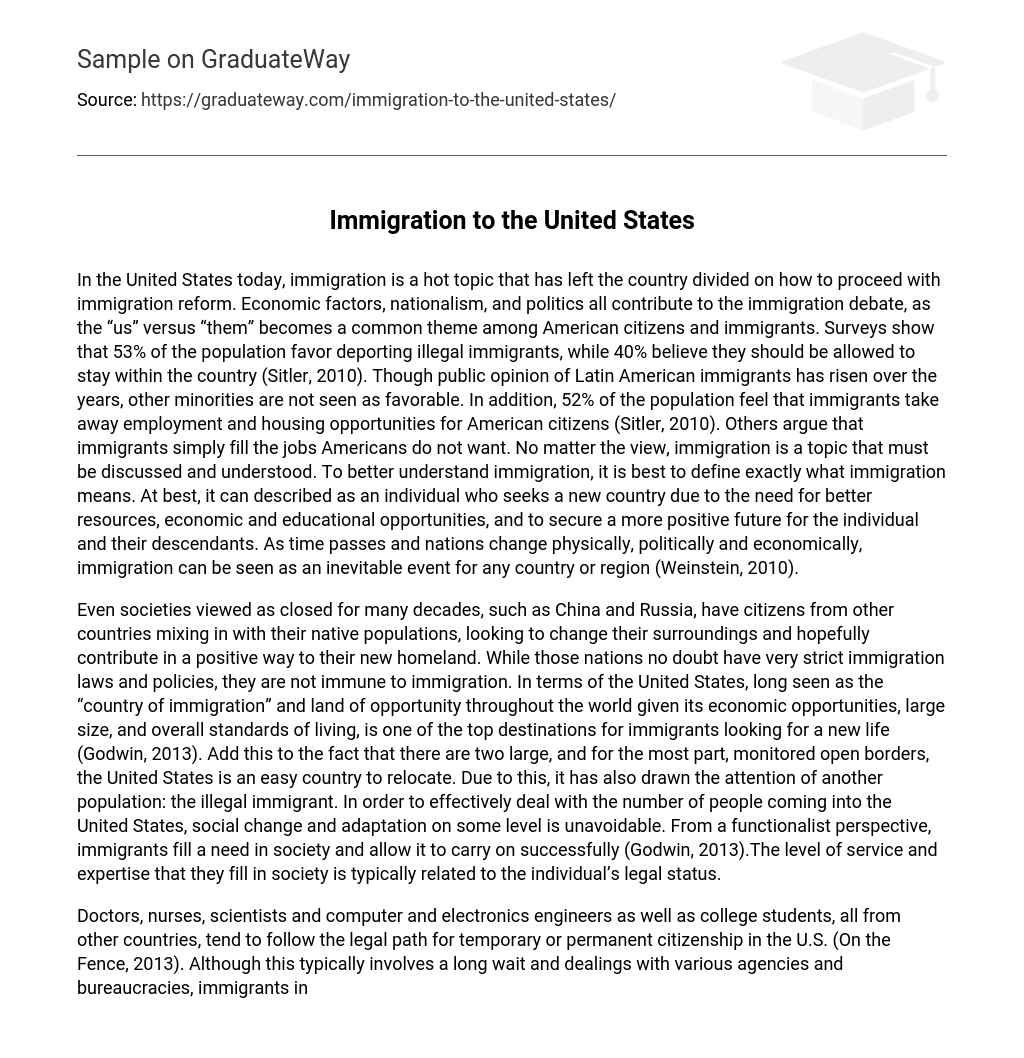In the United States today, immigration is a hot topic that has left the country divided on how to proceed with immigration reform. Economic factors, nationalism, and politics all contribute to the immigration debate, as the “us” versus “them” becomes a common theme among American citizens and immigrants. Surveys show that 53% of the population favor deporting illegal immigrants, while 40% believe they should be allowed to stay within the country (Sitler, 2010). Though public opinion of Latin American immigrants has risen over the years, other minorities are not seen as favorable. In addition, 52% of the population feel that immigrants take away employment and housing opportunities for American citizens (Sitler, 2010). Others argue that immigrants simply fill the jobs Americans do not want. No matter the view, immigration is a topic that must be discussed and understood. To better understand immigration, it is best to define exactly what immigration means. At best, it can described as an individual who seeks a new country due to the need for better resources, economic and educational opportunities, and to secure a more positive future for the individual and their descendants. As time passes and nations change physically, politically and economically, immigration can be seen as an inevitable event for any country or region (Weinstein, 2010).
Even societies viewed as closed for many decades, such as China and Russia, have citizens from other countries mixing in with their native populations, looking to change their surroundings and hopefully contribute in a positive way to their new homeland. While those nations no doubt have very strict immigration laws and policies, they are not immune to immigration. In terms of the United States, long seen as the “country of immigration” and land of opportunity throughout the world given its economic opportunities, large size, and overall standards of living, is one of the top destinations for immigrants looking for a new life (Godwin, 2013). Add this to the fact that there are two large, and for the most part, monitored open borders, the United States is an easy country to relocate. Due to this, it has also drawn the attention of another population: the illegal immigrant. In order to effectively deal with the number of people coming into the United States, social change and adaptation on some level is unavoidable. From a functionalist perspective, immigrants fill a need in society and allow it to carry on successfully (Godwin, 2013).The level of service and expertise that they fill in society is typically related to the individual’s legal status.
Doctors, nurses, scientists and computer and electronics engineers as well as college students, all from other countries, tend to follow the legal path for temporary or permanent citizenship in the U.S. (On the Fence, 2013). Although this typically involves a long wait and dealings with various agencies and bureaucracies, immigrants in these professions are committed to the long term approach, because it is their only legal option. Immigrant professionals tend to be supported by American society in their journey towards citizenship or residency as their potential for contributing is seen as much greater than their counterparts (On the Fence, 2013). Undocumented and illegal immigrants tend to be viewed as “trespassers,” and are viewed as unskilled laborers with little education or formal training. However, these people still fill a need in the workforce and contribute to the economy as well. Divisions of the economy such as agriculture, construction, hospitality, and service industries all require a large number of workers for jobs, without the need for a formal education. Functionalists and certain economists argue that these workers, mostly illegals, perform a vital role in those industries and fill jobs that Americans typically see as too menial or at such a low wage level that they would otherwise not be filled by American workers (On the Fence, 2013).
If these types of jobs were to be filled with higher paid workers, the high labor costs would be passed onto the consumer, and effect the economy. Conflict theorists differ in their perspective in that they argue that immigrants are typically given a lower status in the social framework, and that there is an invisible system designed to keep them there with little chance for advancement (Long, n.d.). Due to the large labor pool made up of mostly of immigrants from Hispanic countries, employers could hire more people than needed and just keep their wages low, resulting in a larger profit and more production. Immigrants caught in this type of exploitative system are less informed about the political and legal process and less involved given their status as non-citizens. Advocate groups exist to help them attempt to improve their situation, but it cannot be made without large scale immigration reform. Another area for debate concerns whether immigrants, mostly the 11 million illegals (On the Fence, 2013) use up more services and funds than they contribute.
Opponents and reformers argue that illegals generate more costs due to more needs for health care and increased law enforcement related activities. Advocates for immigration reform cite that illegals pay their share in sales tax when purchasing goods, property taxes when buying or renting homes, and pay into the social security system on some level, for benefits that will not be paid out to them unless they become citizens (On the Fence, 2013). Immigration to the United States is due to one simple factor: opportunity. Individuals that arrive in the country do not arrive to steal American jobs or take advantage of the welfare system, as it the popular belief in this country. They are here to simply make a better life for themselves and families. Immigration reform is something that has to occur now, in order to open a path of citizenship to the number of immigrants currently in the country, as well as curb the flow of illegal immigrants entering the country. Immigration should be viewed as a benefit to society, in that it keeps the population from becoming stagnant by offering a diverse culture.





